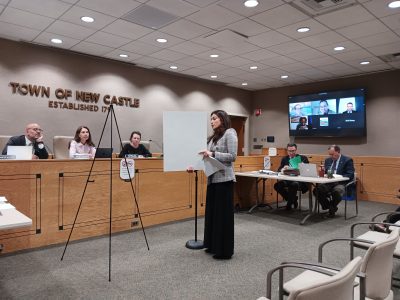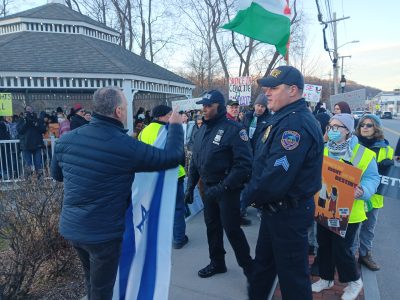New Castle Weighs Sharp Hike to Assembly Fee Permit Sparking Backlash
News Based on facts, either observed and verified directly by the reporter, or reported and verified from knowledgeable sources.

New Castle officials may impose a significantly higher cost to obtain a permit to assemble after it incurred several thousands of dollars in costs related to last month’s controversial ceasefire rally in downtown Chappaqua.
The Town Board is weighing whether to amend the town code to require individuals and organizations to pay what it is calling a $500 Department of Public Works fee. It is also proposing requiring anyone hoping to obtain an assembly permit to take out an insurance policy that would typically offer personal injury and property damage coverage.
A quick online search revealed that insurance coverage for a one-day event could cost close to $300, Town Administrator Jill Shapiro said.
Currently, the cost of a permit to assemble is $25. Organizations that have their own policy as a result of their ordinary course of business are covered.
Supervisor Victoria Tipp said after the conclusion of last week’s combined work session and meeting that the Feb. 3 rally was a key factor in the board proposing the increased cost because DPW and police expenses reached about $4,500 for the roughly two-hour event.
During the public comments portion of the board’s regular meeting, community members, including student organizers of the Feb. 3 protest, blasted officials for trying to clamp down on free speech and make it more difficult for young protestors and other grassroots groups. Last month’s protest called for a halt in the military campaign in Gaza and heavily criticized Israel for killing over 25,000 people since the Oct. 7 Hamas attacks.
Horace Greeley High School sophomore Millie Schwartz, one of the rally organizers, said it is far more likely for young people to push for change, and most would no longer be able to afford the expense.
“By imposing hefty fees and restrictive policies, the powers that be are effectively cutting off our access to public spaces as a means of gathering in protest and solidarity,” Schwartz said. “Students and grassroots organizers such as ourselves do not just have $500 lying around, not to mention more hundreds of dollars in insurance.”
Another organizer said if the proposed action were to be approved, it would make protesting attainable only for the affluent.
Organizers criticized Tipp for a social media post informing members of the community that it was with “a heavy heart” that the town agreed to grant the permit and comply with the law, and what they deemed was her comparing them to the Ku Klux Klan.

“You are grasping at straws, trying any means you possibly could do to block the protest permit, but it is with a heavy heart to inform you that the First Amendment exists, and now since you weren’t able to legally finesse us to shutting down the protest, you’re creating new laws that will make it impossible for us to protest in the first place,” an organizer said. “This new law is elitist, it is discriminatory, it is authoritarian.”
Tipp said she was responding to community members who didn’t want to have the rally take place on its originally scheduled date of Jan. 27, International Holocaust Remembrance Day. The town pressed for the organizers to reschedule the rally for another day.
“I know that you knew that,” Tipp said of the original date coinciding with Holocaust Remembrance Day. “I had conversations with people who were in touch with you and there was a little back and forth about it, as you know.”
The supervisor also stated that she was responding to community members whether the Ku Klux Klan would be allowed to secure a town permit, and wasn’t equating the students’ efforts with the far-right white supremacist organization.
Chappaqua resident Arthur Grant said it was wrong for the town to charge what are prohibitive costs for people to exercise their free speech.
“If you’re going ahead with, essentially, making people have to pay for their rights, which now they’re not rights, they’re commercialized, maybe you should do that for the 19th Amendment as well as the First Amendment,” Grant said referring to the amendment that guarantees all U.S. citizens the right to vote.
Resident Maryam Fatouh presented a list of about a half-dozen nearby municipalities and their cost to take out a permit. Some required insurance and/pr the police department granting approval, but the cost ranged from zero to $50. She vowed that she and many others would fight the town from implementing the higher fees.
The proposal should allow for a waiver provision to allow those unable to pay the fee to gather, she said.
“We cannot allow the Town Board, whether it’s intentional or not, to squelch our First Amendment rights,” Fatouh said.
After the meeting, Tipp said the board will discuss its proposal and the public comments. Should a formal proposal be introduced by the town, it would have to go through a public hearing process.
“We will definitely listen to that feedback,” Tipp said. “We think the points they raised are important. We also listen to our staff and listen to what our costs truly are and what it means to our budget, and so we’re walking the line between these things. I favor free speech but maybe there’s a middle ground, and we’ll try to get to that through the public hearings.”

Martin has more than 30 years experience covering local news in Westchester and Putnam counties, including a frequent focus on zoning and planning issues. He has been editor-in-chief of The Examiner since its inception in 2007. Read more from Martin’s editor-author bio here. Read Martin’s archived work here: https://www.theexaminernews.com/author/martin-wilbur2007/
